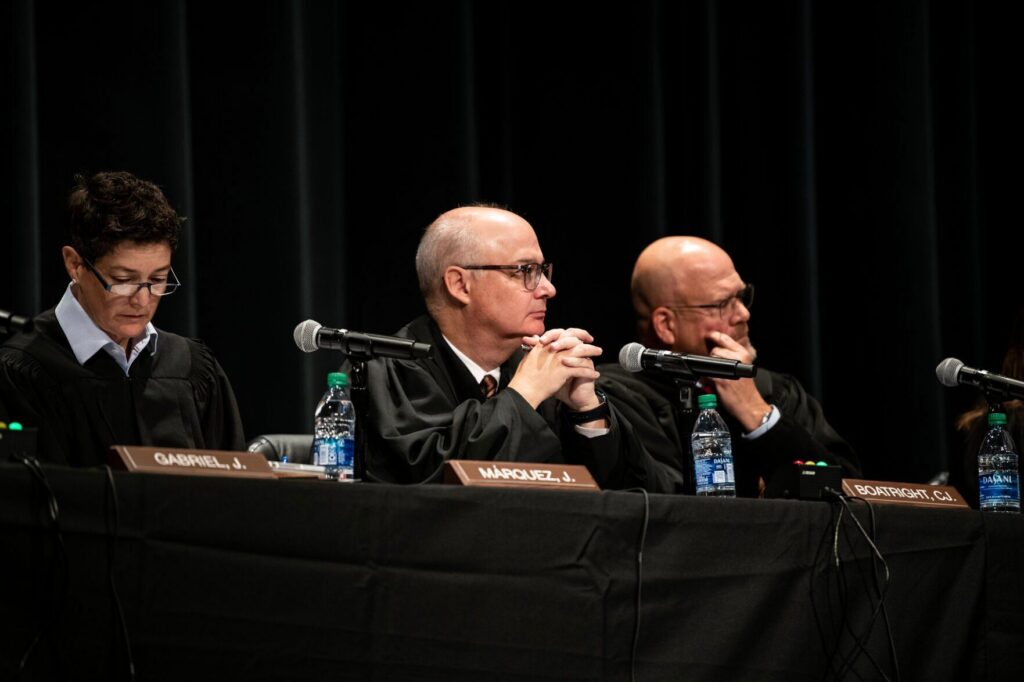Judge dismisses lawsuit against Elbert County sheriff for employee’s alleged misconduct

A federal judge on Thursday decided Elbert County Sheriff Tim Norton cannot be held liable for an employee’s alleged excessive force and wrongful arrest of a Parker woman, in violation of departmental policy.
Tori Plentyhoops filed suit in October against Norton and Sgt. Jonathan Rolff, stemming from a 2021 encounter that resulted in Plentyhoops’ arrest. Plentyhoops claimed Rolff, out of uniform and out of his jurisdiction, wrongfully detained her and made false statements about what happened in order to support a charge of assault on a peace officer.
Norton moved to dismiss Plentyhoops’ claim against him for allegedly failing to train or supervise Rolff in his capacity as sheriff, or for otherwise approving of Rolff’s conduct toward Plentyhoops.
U.S. District Court Judge Charlotte N. Sweeney agreed Plentyhoops had not shown how Norton could be liable for the conduct of his employee, which may have actually violated the sheriff’s established policy on arrests.
“Ms. Plentyhoops alleges the county and the sheriff’s department had a policy that prohibited law enforcement officers from taking action off duty,” Sweeney said in an oral ruling from her courtroom. “Ms. Plentyhoops must allege more than what is curranty pleaded in the complaint to determine defendant Norton was deliberately indifferent to her rights because Sgt. Rolff violated her rights.”
Sweeney gave Plentyhoops 14 days to file an amended version of her lawsuit, in which she may allege more specifically how the sheriff himself caused a violation of her rights. Rolff has not moved to dismiss the claims against him.
According to her lawsuit, Plentyhoops was parked in August 2021 in a parking lot in Douglas County when Rolff approached her dressed in a hoodie and jeans. He reportedly flashed a badge and his gun and said she was driving carelessly earlier through the lot. Plentyhoops handed over her driver license as requested.
However, Plentyhoops soon grew concerned about whether, under the circumstances, Rolff really was a law enforcement officer. She approached his vehicle to retrieve her license, but Rolff refused to return it.
“Rolff, despite being out of his jurisdiction, went hands on with the young woman to take her car keys and restrain her from leaving,” attorney Lisa Moses wrote in the lawsuit. “Although Jonathan Rolff denied that he had ever touched Ms. Plentyhoops, an outside witness that was leaving the fast-food restaurant called 911 to report a man attacking a woman in the parking lot.”
Rolff allegedly told responding Parker officers that Plentyhoops kicked him, leading to charges of assault and driving under the influence. Plentyhoops labeled Rolff’s statements as false. Prosecutors reportedly dismissed the assault charge and her criminal case is now sealed.
Plentyhoops sued Rolff for wrongful arrest, excessive force and malicious prosecution. She lodged claims against Norton and Elbert County for allegedly creating policies or customs that enabled Rolff to violate her rights.
However, Plentyhoops also referenced a sheriff’s directive, Policy 343, that discourages off-duty deputies from initiating stops in cases like Plentyhoops’. Norton should not be held liable, his attorneys argued, for Rolff’s deviation from Policy 343.
“There was a policy that directly contradicts what Mr. Rolff did,” attorney William O’Donnell III acknowledged to Sweeney. But “there’s no history of this deputy violating the policy. There’s no history of other deputies violating the policy. (Norton) can’t be held liable for something (he) could not foresee.”
Moses countered that even if the sheriff’s office issued a policy, Norton could still be liable for failing to discipline Rolff for violating it.
“This is a sergeant who failed to comply with a policy and that, from our information, received no ramifications, no sanctions, nothing,” she argued. “The struggle that we have is that you cannot hide behind a policy if you’re not gonna actually, actively enforce it.”
Sweeney disagreed, finding precedent exists to insulate government entities from liability when individual employees act contrary to established policy. She permitted Plentyhoops to refile the allegations against Norton in order to show how the sheriff himself displayed a disregard to her constitutional rights.
“I would suggest that the plaintiff needs to be real clear as to which theory of liability she is pursuing,” Sweeney said.
With Moses’ consent, Sweeney dismissed the claim against Elbert County, too.
The case is Plentyhoops v. Rolff et al.














